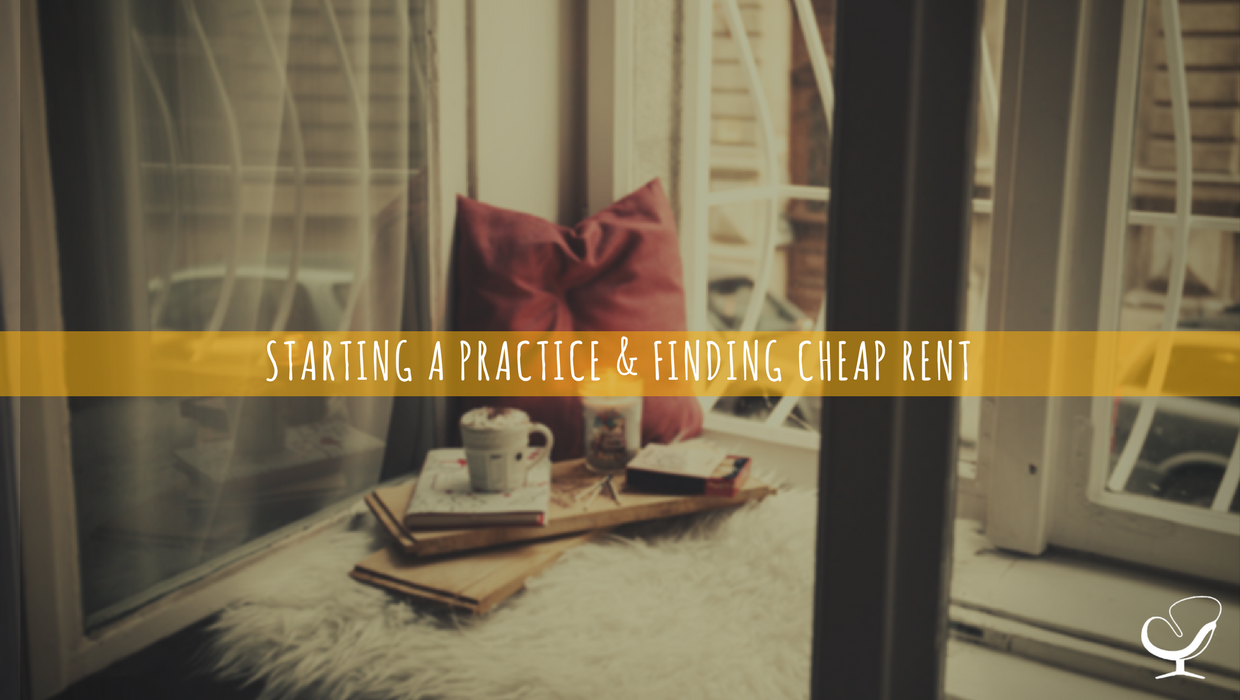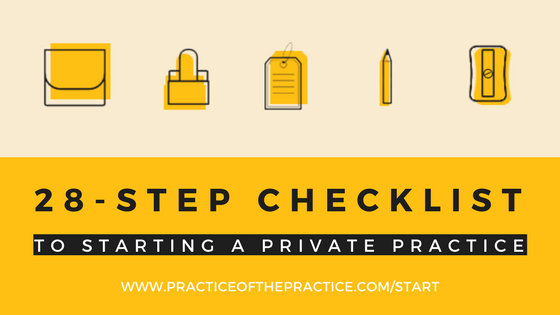Podcast: Play in new window | Download | Embed
In this episode, Joe Sanok speaks about starting a private practice and finding cheap rent.
Podcast Sponsor
Confused by all the advice on starting a private practice? I’d love to help. I put together a checklist of the top 28 things to do to launch a private practice.
In This Podcast
Summary
If you are in private practice and are under the $60 000 mark, this podcast series is for you! Joe is going back to the basics and running through the various phases involved in setting up a practice that is going to thrive! In this episode, Joe speaks about how to find cheap rent for your private practice.
Tips & Advice on Finding Cheap Rent
When you’re first starting out, try to keep your rent low. You want scalability and sustainability.
You can either find and negotiate office space with someone, or you can join a group practice. You can also try to find an office share space.
Useful Links:
- 28-Step Checklist For Starting a Private Practice
- Podcast 89: How To Negotiate Rent & Find Balance
- Legal Structures in Private Practice | PoP 260
Meet Joe Sanok
Joe Sanok helps counselors to create thriving practices that are the envy of other counselors. He has helped counselors to grow their businesses by 50-500% and is proud of all the private practice owners that are growing their income, influence, and impact on the world. Click here to explore consulting with Joe.
Thanks For Listening!
Feel free to leave a comment below or share this podcast on social media by clicking on one of the social media links below! Alternatively, leave a review on iTunes and subscribe!
Podcast Transcription
File: PoP-261 Starting a Practice Finding Cheap Rent
Duration: 0:10:34:00
[MUSIC]
Joe Sanok: This is the Practice of the Practice Podcast with Joe Sanok, session #261.
[MUSIC]
[INTRODUCTION]
Joe Sanok: I am Joe Sanok, your host. I hope you’re doing awesome today. This podcast is all about innovative ideas on how to start, grow and scale your private practice. You have inside you this practice idea and it’s time to pull it out, and I want to be your guide to help you do that. I am here live in the radio center two building in beautiful downtown Traverse City. It is a cloudy day in Northern Michigan and will be until May, and we will be having snow here for a long time. And that’s just how it is when you live in Northern Michigan [00:00:59.05] from Traverse City. So we have doing this series all about how to start a practice. And we have covered all sorts of things up to this point. If you’ve missed the first four episodes this month about starting a practice, go back and check this out. They are sequential – meaning they go in order, which is obviously what that means. But I am walking you through kind of the process. Because I realize I hadn’t taken time to reverse back. We have done a bunch on group practices back in November. We had Alison Pidgeon. She did her podcast takeover. Before that we did a bunch that were on scaling your practice, you know, when you are right at that six figure or above – what you do to amp that thing up. And I wanted to take some time to really step back and say, what do you do when you are first starting your practice. It’s great these people are making six figures. It’s great that they are doing a great job. But what you do when you just want to start out.
I just realized I’m really cold. I’m going to grab my sweater. Hold on a second… I found out that my pharmacy screwed up and I was supposed to be getting 225 mcg of my thyroid medication and actually was only getting 25 since April, and my numbers were through the roof. And my doctor said I should have been, like, comatose and tired. So I am waiting for my meds to start kicking back in. But it’s been fun to see, I guess, my team’s reaction where they said, well, this was you, unmedicated like, can’t wait to see what happens when you are medicated (laugh). So if I have seen to be little bit tired since April, well, that’s what was happening. It’s a reason that my hands got so swollen that I couldn’t fit my wedding ring on. So if you had noticed I haven’t been wearing a wedding ring, everything is cool with me, Christina. Just got a swollen finger and didn’t want to put [00:02:59.29] ring on, like, never get it off, among other symptoms. When I was first starting on my practice…. I mean that had nothing to do with my practice and, although I guess it kind of does. You know, you get power through. You drink your coffee and don’t have a thyroid things like that as you do.
Anyway, so when you’re starting first starting a practice, it’s so darn confusing. It’s… you don’t know what to do first, second, third, fourth, when it grows, when it takes off. I was just talking to three different people that were applying to do my Next Level Mastermind Group [00:03:33.25] on that $100,000 mark yesterday. And literally it was the same conversation three times that they kind of built these systems. The practice had really taken off. They had maybe taken more insurance than they wanted to, and they were ready to scale, but it was all based on them sitting in the chair. And for them that idea of working harder just wasn’t going to fly. They were already working terribly hard. And so when we are starting a practice, we want to really build those systems that can help you scale. You don’t have to undo too much, while also recognizing that when you are just starting that…
Sorry I feel a yawn coming. It’s all thyroid. I think it’s just funny. Now I know why I have had this little kind of like tiredness, just as a tone over me.
So when you are starting you want to really kind of have the balance of having systems that can scale with you, while also recognizing that this phase is more about bootstrapping. It’s about having the time to put into your practice and to really make sure that we can, kind of, grow it. And so today we are talking about finding a place to do counseling or to do your practice. I know we have a lot of people that are outside of the counseling space that are tuning in now, like speech pathologists and speech therapists and occupational therapists. I want to make sure you feel included in this also.
[FINDING OFFICE SPACE: TIPS & ADVICE ON FINDING CHEAP RENT]
When you are first starting out, the biggest thing is you want to keep your risk low. So signing a five year lease, it’s 2 grand a month and has 4 offices, because you want to group practice someday, is not the best idea at this phase. You want to look for scalability and you want to look at sustainability. So what that means is you want a place that can grow with you. So when fist started out my practice, and many of you may know this, I negotiated rent with the landlord. I was an established psychologist in town in the front office. There’s two offices – a bathroom and a shared waiting room. Really small shared waiting room. The style of the office was not my style at all. The couch was this like cream and blue checkered pattern, had brass lights, one of those accountant rolling desks, like rolltop desks where you can kind of close it. Not my style at all, but I could pay 20 percent of what came in to that landlord, but my maximum I would pay per month was above market value. So for him it was beneficial because as I started to grow I was paying about $100 more a month than I needed to and I also felt a certain sense of obligation, just stick around when I was at that point because he allowed me to kind of grow as I grew and pay as I grow, and so having an agreement like that could be really helpful. And so approaching therapists that already have a practice and looking at days that they aren’t there, so they don’t have to give anything that really their office is already empty, is a great way when you are starting a practice to find a place and to grow. So that might look like say Sherin owns a established counseling practice. She is pretty busy. But you know every Tuesday and Thursday night her son has soccer practice. She works half a day on Fridays and is never in the office on Saturdays or Sundays. To talk to Sherin about hey, could I potentially use your office on Tuesday and Thursday night, Friday afternoon and Saturday morning. I’ll pay you $20 per session that I do and then that brings in extra revenue into your practice that you wouldn’t have received and then, you know, I don’t have as much risk in starting my practice. And I am happy, as people aren’t a fit for me, to refer them to you facing like a good fit for you. That’s probably the best model.
Another model is to join a group practice, but to me that really is tough because then it’s harder to leave because that person kind of invests in you. So I wouldn’t really recommend that.
There are models with like Regus and other places that you can do an office share. That can get kind of annoying because you have to take your files with you often times, you don’t have a space that you can lock them up there. You want to make sure you understand this, especially the HIPPA compliance side making sure your files are double locked from people, so that there is never any confidentiality issues. You want to know about the WiFi. You want to know about all those different things that kind of break the confidentiality.
[CONCLUSION]
But having that conversation don’t be discouraged if the first few people don’t even return your phone call. It’s going to take little bootstrapping, but I would highly recommend you start with keeping your costs low. So if you want more of these tips, I have an email series that it’s totally free walks you through kind of those kind of three big parts, of the setup phase which we are talking about right now. The attracting client’s phase, which is the second phase. And then the systems to grow phase. All three of those phases with starting a practice. So you get the part 1, part 2, part 3. Each one is about 3 to 4 emails within their parts. So ends up being about 12-13 emails that really walk you through that. It really takes away that confusion, that feeling overwhelmed. And it’s organized. It helps you grow faster, to start that practice that you want to start. The very first thing you get is a 28-step checklist, then there is a 5-minute video that shows you how to quickly evaluate the local counseling scene, gives you some quick tips on what to look for and how to know if it’s going to be very easy to launch or really hard. And then you are going to get those emails that are paced out for you. We don’t throw all at you that once. We pace it out. Every three or four days, you are going to get emails saying, all right, let’s start working on this next step. Let’s start working on this next step. That’s really going to help you grow your practice and start your practice right, so that you don’t have to undo a whole bunch of stuff later. Thanks for letting me into your ears and into your brain. Next, we are going to be talking about attracting clients. We are moving into that phase two. Within that, we are going to be talking about websites, we are going to be talking about networking with people, we are going to be talking about systems to help you grow.
Thanks for letting me into your ears and into your brain. Have a great week. Bye.
[MUSIC]
Special thanks to the band Silence is Sexy for Intermusic, and this podcast is designed to provide accurate and authoritative information in regard to the subject matter covered. It’s given with the understanding that neither the host, the publisher or the guest are rendering any legal, accounting, clinical or other information. If you need a professional, you should find one.
[MUSIC]
[END OF PODCAST 00:10:33.24]



